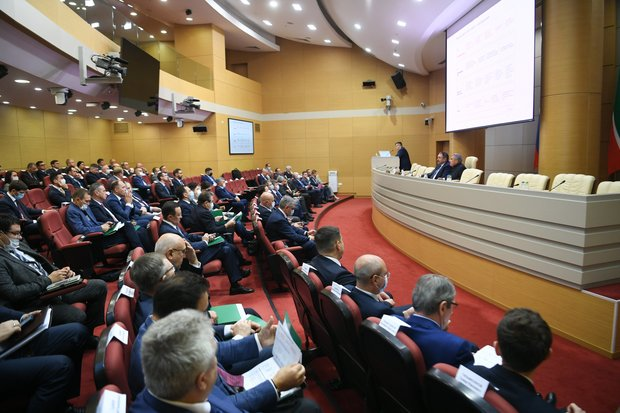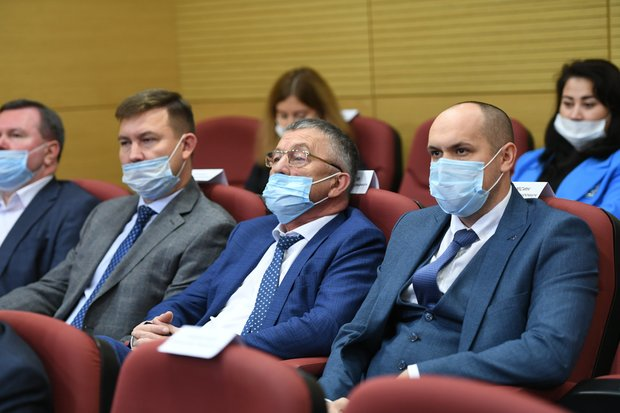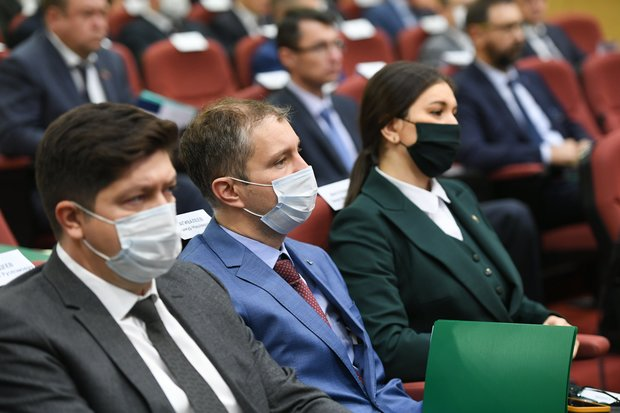Rustam Minnikhanov: ‘Sanctions will get tighter, everything will end when we get it all here’

“This document is yet declaratory, but it needs to be applicable, working,” Rustam Minnikhanov insisted on rewriting requirements for the “grant” system of import substitution in the country. At another board meeting of Tatneftekhiminvest-holding on 29 September, distribution terms of non-repayable grants in a federal programme for 10 billion rubles were presented. No matter how hard they praised the programme’s operator Centre for Engineering and Innovation Support for wrestling away resources from the Russian Finance Ministry they asked to bring it down to earth so that businesses can “put a signature that they got money”, not “go hither and thither.” Read more in Realnoe Vremya’s report.
Non-repayable grants of up to 250 million rubles per product
The presentation of a federal grant system designed to localise foreign equipment and technologies in Russia became the main topic on the agenda of the board meeting. The rules of how they are awarded are defined by the Russian government’s decree adopted on 17 March 2022.
Innovative Engineering Centre is the ideologist of the programme, and the Centre for Engineering and Innovation Support is the technical operator. The main message is to provide grants for foreign critically important components and equipment. Producers can get a non-repayable tranche of 25-250 million rubles to make one product. The total cost of the programme during the next three years was 10 billion rubles. This sum is expected to grow to 42 billion until 2030.
Director General of Innovative Engineering Centre Nikolay Kolpakov explained first how local suppliers can fit in the federal grant system. He gave the audience to understand from the very beginning that grants were not awarded in the habitual way — you submit an application for the competition and wait for a result. The approach is absolutely different here. According to him, federal financing is available if the future grant project has a client in the person of a big corporation and supplier in the person of a manufacturer. A four-level control system was created to select and examine grant projects at Innovative Engineering Centre. 12 largest Russian corporations among which there is Gazprom, Rosneft, Transneft, Nornickel, Russian Railways (Editor’s note: they are co-founders of the centre) are key partners of the centre.

Corporations transfer contracts for 5 trillion rubles to Russia
In fact, corporations can become the first clients for future grant recipients if they can make products according to terms of reference instead of foreign products and launch their serial production. According to Kolpakov, now big corporations transfer contracts located in the West to the territory of Russia and choose suitable suppliers.
“We have already covered a big road with Gazprom PJSC, and thanks to this mechanism it became possible to transfer the biggest contract on a series of gas producing Class A platforms for offshore field development from abroad to the country,” he put a bright example of import substitution.
According to him, orders for 73 billion rubles were placed in the first task. “We are sure the Russian industry will perform this task,” Kolpakov assumes. “We are already in contact with several other corporations. So we are discussing the replacement of crane mechanisms at Dudinka Port with Nornickel.”
In general the operator needs to transfer orders for 5 trillion rubles to Russia until 2030, the speaker noted. The sum is huge because “the dependence on foreign solutions in the corporation was huge,” while when uniting the orders the mechanism of grants will “show its liveability,” he explained. The director general of Innovative Engineering Centre said that the list of clients among corporations can expand thanks to the involvement of Tatneft, Ak Bars Holding (according to the rules, it can be a company with a turnover of 100 billion rubles). Only KAMAZ PJSC has so far joined them among Tatarstan companies.

If 46 billion rubles of state investments will be enough
Rustam Minnikhanov was positive about the speech and claimed that “the country has never had such a mechanism.” “We see that sanctions will get tighter, life will get tougher. All this will end when all that is ours We shouldn’t go and ask, we should develop ourselves,” he noted.
This mechanism raised doubts among managers of the Tatarstan industrial complex. So head of Alabuga Special Economic Zone Timur Shagivaleyev asked if 46 million of state investments were enough to localise foreign products for 5 trillion rubles Russia needed.
In reply, head of Innovative Engineering Centre Nikolay Kolpakov explained that of course, the sum was not enough but it was a test mechanism that would expand in the future.
The Tatarstan president recommended not criticising new mechanisms of federal support but joining the work: “I also asked why 100-200 million rubles are allocated for every product, why so little? But let’s start here, let’s start showing a result,” he supported the Moscow guest.
“Lads, has anybody gone to the Russian Finance Ministry to get money?” he addressed the audience. “It is the Brest Fortress. How much time did it resist the Germans? Three months? While here...” Rustam Minnikhanov gave them to understand how valuable every support instrument was at the moment. “There is a powerful authoritative structure in the country,” he asked them to take engineering projects serious. “Not so many regions can participate in this system. There are just ten. The other recipient regions can only ‘process’ money, while we grow money. Technologies, factories, jobs are needed for this.”
“Where will you find corporations with a revenue of 100 billion among industrial enterprises?”
Director General of the Centre for Engineering and Innovation Support Pavel Dvornichenko talked about the requirements to receive the grants in detail. Firstly, the candidate must have a revenue of at least 500 million and no more than 10 billion, and the grant is awarded in co-financing terms in 50/50 ratio. “The grants are awarded to create or modernise the production to make products for certain tasks of Russian corporations. The client sets technical parameters and the price of the product. Terms of reference are added to the agreement with the grant recipient. The financing term is three years. During six years since the start of providing grants, the enterprise is obliged to create the necessary product and sell five times more in relation to the grant sum,” he said.
All areas except for construction are supported. This includes R&D, tests, modernisation of production, that’s to say, all expenses before serial production.

But a candidate cannot have public partnership, it cannot be affiliated with the client.
“We signed agreements with KAMAZ,” said Dvornichenko. “We are waiting for them to create a coordination council to participate in the project. I would like to invite corporations with a revenue of 100 billion and Tatarstan enterprises with a revenue from 500 million to a billion to participate in our programme.”
“Many things are ridiculous”
The requirements for corporations confused the president of the republic. “Where will you find corporations with such a revenue among industrial enterprises?” Rustam Minnikhanov doubted. According to him, these ridiculous requirements need to be adapted to make sure these grants work. “They exist but you cannot use them,” he complained. “Many things are ridiculous. It needs to be corrected a bit, we are ready to join,” he offered.
He says that sometimes functionaries “put so much effort to make sure it doesn’t work instead of sitting and thinking how to make it work.” “But we are patient, we have skills, we are ready,” the president repeated and reminded how he had to bring the decrees No. 1704 and No. 1119 down to earth that expanded the preferential regime from five to 15 years for management companies of special economic zones. Also, the president of the republic doesn’t like that companies with public partnership cannot participate in the programme.
“I offer to create a taskforce, to change these indicators. This document is yet declaratory, it needs to be applicable. It needs to be done with the example of Tatarstan so that is acceptable.”
The president of the republic offered to create a taskforce in every area. “We will bring these document down to earth. KAMAZ moves ahead, Tatneft fits in in all the areas, I task Nail Maganov with working with his colleagues. SIBUR, TGC-16, Grid Company — we have a lot of projects with energy companies, in petrochemistry, oil refining,” he enumerated priorities. The head of the Ministry of Industry and Trade said that ICL, HMS, Kazan Motor Production Association, Eidos are ready to become suppliers.
At the end of the meeting, Director General of RUSTECH Lenar Fazlyev reported on a metal cold cutting technology that almost all industrial enterprises need when disassembling old equipment. It can cut both metal and bitumen without the risk of a fire on the site. “This technology rules out long preparations, reduces the time it takes to disassemble. Producers of explosive substances and those who store gunpowder and oil products in the warehouse are the main interested companies,” he said.
“Tupolev has faced this problem so many times, facilities have had to be rebuilt,” Rustam Minnikhanov complained and asked Director General of Kazan Gunpowder Plant Alexander Livshits to assess this as an expert. The plant started to disassemble obsolete constructions two years ago. “Then we tested this technology, cut vessels where a dangerous product was. We couldn’t use either welding or saw. This technology allowed us to disassemble a big container. We will start to disassemble the next container in two weeks. At the moment I see only one disadvantage — the cutting speed is low,” Livshits replied. In turn, the president recommended using more cutters.